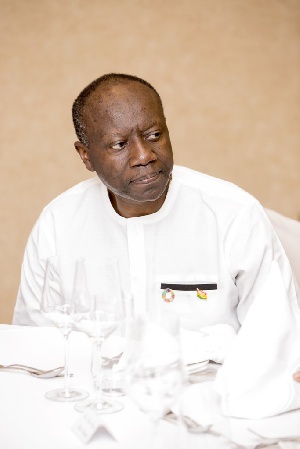 Ken Ofori-Atta, Finance Minister
Ken Ofori-Atta, Finance Minister
The founder and leader of United Front Party (UFP), Dr. Nana Agyenim Boateng has fired a salvo at Ghana’s Finance Minister, Mr Ken Ofori-Atta claiming the latter is incompetent in managing the economy and best at taxing poor Ghanaians to the marrow, MyNewsGh.com reports.
According to him, the renowned banker has failed woefully in managing the economy though he is said to be partially doing well when it comes to financing.
“The Finance Minister has failed in managing the economy but when it comes to financing, I think he is not doing badly at all”, the businessman cum politician observed.
According to Dr. Agyenim Boateng, taxing of so-called luxury vehicles by the Akufo-Addo led government is a clear manifestation that incompetent people are at the helms of affairs in the country currently and the earlier the competent persons are put in charge of affairs the better for the country.
“All that Ken Ofori-Atta knows is taxing …taxing, taxing. He always wants to take monies from us the businessmen without any good policy to sustain what we are doing”, Dr. Agyenim Boateng spoke on Nhyira FM morning show monitored by MyNewsGh.com.
He, therefore, hinted another massive demonstration will soon hit the Akufo-Addo led government New Patriotic Party (NPP) government to protest against the luxury tax law now in operation.
Luxury tax
The government introduced the vehicle luxury tax in August 2018 as a new policy to help raise more revenue.
Vehicles with engine capacity of 2950 to 3549 Cubic Centimetres are required to pay GH¢1,000, while those with engines between 3,550 to 4049 cubic centimetres pay GH¢1,500. Vehicles with engine capacities above 4049cc are to pay GH¢2,000.
The levy is also imposed on vehicles existing prior to the passage of the Law with the above-listed cubic centimetres.
Vehicles whose roadworthiness certificates have already been renewed prior to the passage of this Law in 2018 will pay the levy starting from their next renewal date in 2019.
The following categories of vehicles are exempt from the levy: tractors; ambulances; commercial vehicles that have the capacity to transport more than ten persons; commercial vehicles for the transport of goods; other exemptions as may be prescribed by the Minister responsible for Finance.